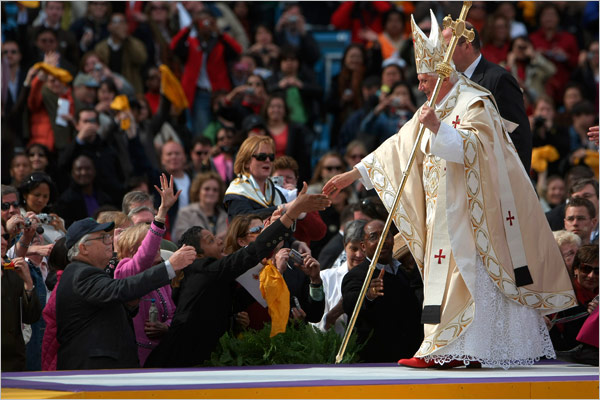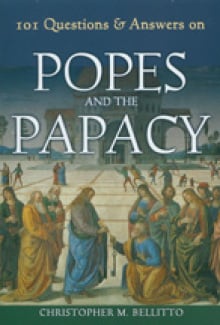Pontius Pilate famously asked that question and the Gospel of John provides the answer, as did Pope Benedict XVI in recent days, most notably in his talk to young people at St. Joseph’s Seminary in Dunwoodie in New York:
“In seeking truth, we come to live by belief because ultimately truth is a person: Jesus Christ.”
Indeed, the brightest thread running through the pope’s talks and homilies was truth, and the need to be confronted by truth, and to see truth, and to find truth–and find it in Christ. For believers–and that would include just about every Catholic at the stadium masses and other events, as well of those who could not get inside–the pope’s statements are self-evident. They are a useful and salutary reminder of a basic teaching, and not especially controversial, though certainly worthy of much reflection. A fine starting point is a post titled “Veritas” by Peter Nixon over at the Commonweal blog.
But the focus on truth and the exhortation to believe in Christ more truly and live as a Christian more truly reminds me of the story about a pagan in the ancient world who was interested in becoming Jewish. He went to the Jewish sage Hillel and challenged him to explain the entire Torah while standing on one leg. Hillel agreed, and said simply: “That which is hateful to you, do not unto your fellow.” In other words, the Golden Rule.
“That is the whole Torah,” Hillel said. And he was right. But he was also wise. “The rest is the explanation,” he added. “Go and learn.”
In a sense that is where we are after the pope’s visit. He explained the faith but provided few directions for the church. He called for unity in Christ, but did not give many explanations about how to find that unity. For many, that is more than sufficient. In fact, a great many Catholics–and non-Catholics–will simply be happy to see that the panzerkardinal is not the panzerpapst, and that the Catholic Church seems to be in good hands.
But I suspect stronger reactions to the pope’s visit will break down along the lines of those who see the churchs (and the world’s) problems as traceable to a weakness of faith, and thus best healed by an exhortation to greater faith, and those who see the church itself as in need of repair. The former category will feel affirmed, the latter may be ambivalent.
For them, the lack of direct discussion of the priest shortage that makes evangelizing so problematic, or the role of women who make parishes run and Catholic families the “domestic church,” or accountability of bishops, or the laity who did so much to bring the abuse scandal into the open and force this moment of catharsis, or the Iraq war, or social justice issues, or global warming, or the death penalty, or any one of a number of issues raises the big question going forward: What now? How does the church tackle these issues effectively and still find the unity that Benedict rightly enjoined? (Truth be told, the pope was often so conceptual in his talks that many lament he did not say more on abortion, or much of anything on contraception or homosexuality or divorce.)
Two posts from the New York Times’ fine stable of papal bloggers seem emblematic of the divide. One was Peter Steinfels’ lament that the pope’s talk to Catholic educators–what was billed in the pre-trip build-up as a showdown–was actually a “missed opportunity” to clarify certain issues. Another might be Alejandro Bermudez’ take titled, “A few Good Men and Women.” To wit:
“I have repeated this so often that I risk being tedious: the Pope is a minimalist…He hopes many non-Catholics will come to the Church attracted by the “Splendor of Truth.” But he does not count on that happening. (snip) Will he be the one identifying who is or who isn’t a good Catholic? Nein. He knows better. He will let American Catholics go to the waters. And each one will take their side in history by the way they drink it.”
There is more to unpack here, and I’ll try as I sift through the coverage and the blogosphere and Benedict’s homilies this week.

